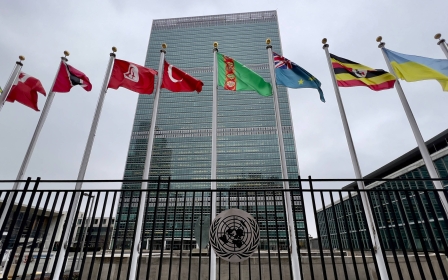IHRA antisemitism definition 'suppressing Palestinian advocacy in Europe'

The International Holocaust Remembrance Alliance's (IHRA) working definition of antisemitism has disproportionately impacted people of colour and Jewish advocates for Palestine, leading some to lose their jobs or face censure or legal action for perceived infringements, a European rights group has warned.
Drawing on 53 case studies from Austria, Germany and the UK, the European Legal Support Centre (ELSC) said institutions in all three countries were implementing the controversial definition "as if it was law", despite it being branded as "non-legally binding".
The ELSC also criticised the European Commission for ignoring growing concerns with the definition.
"All of the accused were targeted for advocating for Palestinian rights, denouncing Israel’s practices and policies and/or criticising Zionism as a political ideology," the ELSC said in a statement, following the publication of a report on Tuesday titled Suppressing Palestinian Rights Advocacy through the IHRA Working Definition of Antisemitism.
"When legally challenged, most of these allegations of antisemitism were dismissed as unsubstantiated."
New MEE newsletter: Jerusalem Dispatch
Sign up to get the latest insights and analysis on Israel-Palestine, alongside Turkey Unpacked and other MEE newsletters
The report highlighted cases of academics, students and pro-Palestine rights activists who have been penalised for voicing criticism of Israel.
"Allegations of antisemitism that invoke the IHRA WDA, in the documented cases, are overwhelmingly targeted at Palestinians, Jewish people and organisations that advocate for Palestinian rights, suggesting that the IHRA WDA is being implemented in a discriminatory manner," the ELSC noted.
"Even though most challenges to the implementation of the IHRA WDA were successful, the disciplinary procedures and litigation resulting from false allegations of antisemitism have produced a 'chilling effect' on the freedom of expression and assembly."
The ELSC noted that among the 53 people interviewed for its report, 42 cases involved the targeting of groups with "members who are People of Colour or the targeting of individuals who are People of Colour, among whom 19 were Palestinians.
"In 11 incidents, groups identifying as Jewish or Jewish individuals were targeted, in particular those with anti-Zionist views or sympathy towards the Palestinian struggle for human rights. All the individuals and groups who were targeted in these incidents expressed sympathy towards Palestinian human rights," the ELSC noted.
'This data [suggests] that Palestinians and their allies, whether Jewish or People of Colour or others, are primary targets of those using the IHRA WDA to delegitimise, smear or sanction them'
- ELSC report
"This data shows potential discrimination in the way the IHRA WDA is implemented, suggesting that Palestinians and their allies, whether Jewish or People of Colour or others, are primary targets of those using the IHRA WDA to delegitimise, smear or sanction them."
It added that some participants had lost job offers and employment and some had been sued by local governments for allegedly breaching the IHRA definition.
Student events associated with Israeli Apartheid Week were cancelled for allegedly breaching the IHRA definition, including a lecture by a Holocaust survivor at the University of Manchester.
EC policy 'detrimental to fundamental rights'
Giovanni Fassina, director at the ELSC, took aim at the European Commission, which promoted the IHRA definition via its 2021 handbook on antisemitism, saying the body had "consistently ignored and dismissed the growing human rights concerns about the IHRA WDA and failed to take measures to prevent any adverse impact of it on fundamental rights.
"It is time for the European Commission to acknowledge and address that the policy it has been promoting and implementing on the basis of the IHRA definition, both at EU and member state level, is highly detrimental to fundamental rights and that it is fostering anti-Palestinian racism," Fassina said in a statement.
The IHRA definition was formulated in 2004 by antisemitism expert Kenneth Stern in collaboration with other academics for the American Jewish Committee, a Jewish advocacy organisation founded at the beginning of the 20th century and based in New York.
Stern said he formulated the definition specifically for European data collectors to help them monitor antisemitism.
But critics say some of the accompanying examples conflate antisemitism with anti-Zionism, or criticism of historical and current policies that led to the creation of the state of Israel in 1948, the expulsion of hundreds of thousands of Palestinians from their homes in modern-day Israel, and continuing human rights abuses against Palestinians and occupation of Palestinian lands by Israel.
The UK was the first country to adopt the IHRA definition in Europe, in 2016, followed by Austria in April 2017. In September 2017, the German federal government, then a coalition of the conservative CDU-CSU and the social democratic SPD, endorsed the IHRA definition by decision of the cabinet. Local government institutions and membership organisations have also independently adopted or voted to adopt the IHRA definition.
This article is available in French on Middle East Eye French edition.
Middle East Eye delivers independent and unrivalled coverage and analysis of the Middle East, North Africa and beyond. To learn more about republishing this content and the associated fees, please fill out this form. More about MEE can be found here.




